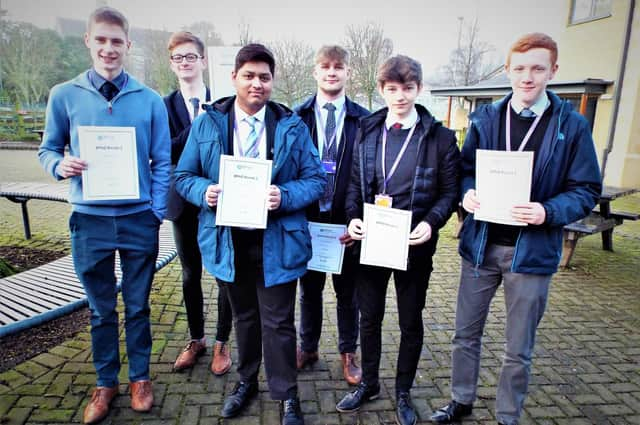Lancaster sixth formers succeed in tough British Physics Olympiad


The following students did extremely well and were presented with their certificates this week:
Lukas Walls achieved Silver while Thomas McCartney and Rhys Bevan achieved a Bronze I. Abrar Chaudhry achieved Bronze II and Joe Taylor and Pawel Gajda received Commendations.
Advertisement
Hide AdAdvertisement
Hide AdIt has taken some time to release the results due to the volume of entries and marking required.
This paper is a challenge and is not an A-level replica or a guide to A-level performance, and nor does an expected A* at A-level indicate that a top result will be obtained here.
It is a very tall ladder of skill, ability and preparedness which students climb until they grind to a halt. Participation itself reflects strongly on a student’s interest and determination.
Students achieving a certificate of any colour in the BPhO are very able physics problem solvers.
Advertisement
Hide AdAdvertisement
Hide AdIn 2021 certificates were awarded to the top students in the following numbers:
170 Top Gold
220 Gold
400 Silver
400 Bronze I
840 Bronze II
360 Commendations
Robin Hughes from the British Physics Olympiad said: "This year 2,300 students from 393 schools participated from the UK and from a few schools overseas.
"This paper challenges a range of student knowledge, preparation and ability, allowing access for good students, whilst also aiming at stretching and challenging the top young physicists in the country in a national competition.
"Less successful students may feel disappointed, but the point is not to worry about the few at the top end for whom competitive problem-solving appeals, but to consider how they have developed their problem-solving skills to tackle these questions.
Advertisement
Hide AdAdvertisement
Hide Ad"This is the skill that universities are looking for. They should review some of these questions and understand how they can be approached.
“University professors have taken this at school and 'got nowhere'. Every question requires a different perspective to get the measure of it.
"This fluency in recognising topics and linking ideas is, in part, what develops the physicist's confidence and mastery. It takes time and perseverance to master this challenge and a lower mark is no reflection on a student's ability in physics, whilst perhaps providing the spur to improve their skills in this area.
"This really is about a particular skill, which must be developed over time.”
Physics teacher Mr Menadue was unable to be present at the group photograph but is extremely proud of their achievements.